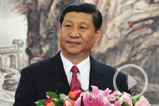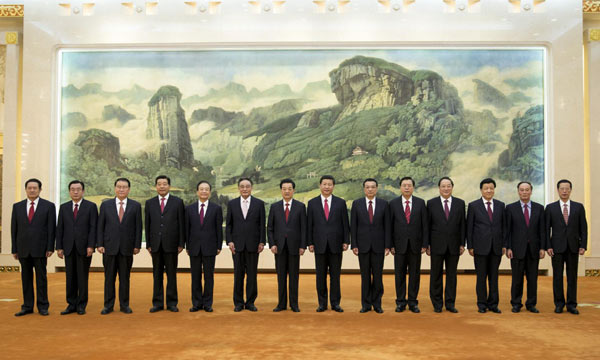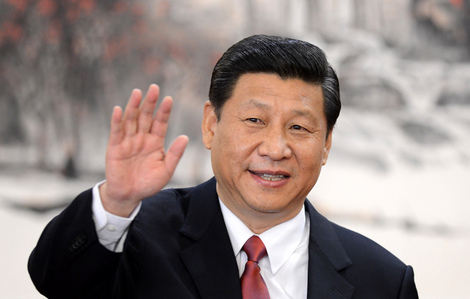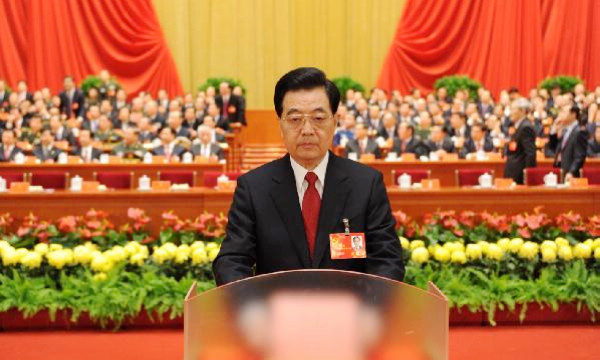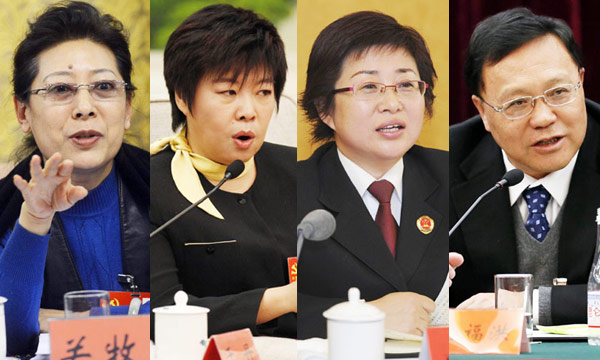Rising China benefits 'Community of Human Destiny'
(Xinhua)
Updated: 2012-11-15 11:30
BEIJING - Consider this hypothetical situation. Some Chinese are discussing how to do business in a win-win manner, and they decide that if one of them makes money by running a gas station, another will open a restaurant just next door, and a third will open an adjoining supermarket. In this way, each of their businesses can grow with the help of the others, avoiding direct confrontation or competition from less cooperative neighbors.
This way of doing business may seem the stuff of fancy, but it reflects the rational order in the eyes of contemporary Chinese. It was also reflected in political report to the 18th National Congress of the Communist Party of China (CPC), which closed Wednesday.
The report advocated a community sense of human destiny that would bring the interests of different nations together.
The post-industrial era witnessed a world in which the weak were the prey of the strong: dominant powers waged wars to carve up territories and claim resources, while the weak were reduce to miserable colonies. It was rare for anyone to truly think of common destinies and interests.
A new international order was established after World War II with the founding of the United Nations. For over six decades, the international community has endeavored to create a more balanced, just and rational political and economic situation. Unfortunately, with the manipulation of great powers, there are still faultlines kept open by regional unrest or even local warfare, in which the innocent have lost their lives.
The rise of China has been a recent phenomenon in the 21st century. Although China has repeatedly stressed that it is a well-intentioned latecomer, the rising country still unnerves the defending superpowers.
Apparently, the world has not simply become flat because of economic globalization. Behind international relations are contests and conflicts of different ideologies and interests.
As one of five permanent members of the UN Security Council and the world's second-largest economy, China has become a presence to be reckoned with. During the past three decades of reform and opening up, the country has accumulated considerable material wealth to become the largest exporter and the second-largest importer in the world.
The impressive progress, however, has triggered panic and is used by some people to rail against China. For instance, "Made in China," or Chinese manufacturing, is a phenomenon that has faced various trade barriers since the country becomes the world's factory.
In addition to solar photovoltaic units, one of the most recent examples is products of China's Huawei Technologies and ZTE. A report issued last month by the US House of Representatives Intelligence Committee advised US companies avoid buying equipment from the two Chinese companies as they were suspected of utilizing their market access for possible spying in the United States.
Other charges include currency manipulation, foreign intellectual property theft and job stealing.
Such "misunderstandings" are deeply rooted in the zero-sum Cold War mentality. Those who refuse to abandon such thinking often purposely overlook the fact that the rising China brings fortune and opportunities to the entire world though it has deficiencies.
Around the world, one may find that the Chinese are carrying oxygen to the choking global economy: throngs of Chinese real estate investors have landed in the United States for buying tours; in the European heartland, Chinese multinationals like Huawei and Haier create jobs; the number of Chinese studying overseas topped the world by approaching 340,000 in 2011, boosting local educational industries; millions of Chinese tourists bring surprises to places where they arrive.
The world economy has failed to find new impetus after the Internet bubble burst in 2000. The spreading debt crisis may put developed economies including the United States, Europe and Japan into a prolonged economic downturn. China emerged as a sustained growing force with a 20-percent share in the contribution to world economic growth. The country is expected to become the world's biggest importer in coming years, bringing huge business opportunities to its trade partners.
The report to the 18th National Congress of the CPC proposed the concept of "beautiful China" that indicates a more prominent position of ecological progress in the country's overall development plan. That will contribute to alleviating the increasing pressures of this resource-starved planet.
Besides, the report says the Party aims to double the per capita income for both urban and rural residents by 2020. If the plan works, Chinese people will have a better life and China will become both a stronger purchasing power and a larger consumer.
The achievements China has made so far, to a great extent, should be attributed to the socialist market system, a goal of economic reform proposed after the country's reform and opening up to the outside world more than three decades ago. It is this dynamic that brought about the historic leap of the Chinese economy. The fresh ideals proposed at the Party congress will take the country further forward.
Besides material wealth, the unique path of "socialism with Chinese characteristics" may offer some lessons for human beings as people can learn through comparisons of different modes.
Nobel Prize-winning American economist Paul Samuelson pointed out in his bulky textbook Economics (17th edition, co-authored by William Nordhaus) that a private market mechanism with only a limited role played by the government cannot resolve problems concerning the interests of the majority in society.
The Party congress report outlined an ideal society for Chinese people and the world at large. It actually looks quite similar to the ideal society Western sages envisioned: productive, civilized, prosperous and harmonious.
China's pursuit of the right objectives is not only important for itself but for the whole world, said Pieter P. Bottelier, a senior associate professor of China studies at Johns Hopkins University's School of Advanced International Studies, in a recent interview with Xinhua.
China has a long way to go before achieving these objectives. The country ranked 77th out of 213 economies in 2011 with a per capita gross national income of $4,940, according to World Bank data. It needs a peaceful global environment for focusing on economic development.
Also, it needs more interaction with other countries and regions. The country's new generation of political elites will deal with the issue. With first-hand experiences of the country's reform and opening up as well as globalization, they have a widened worldview. They are expected to play a positive role in building an orderly international community in line with expectations of both Chinese and other nationalities. But it also depends on whether the world will give positive feedback.
Chinese leaders have reaffirmed that the country is committed to peaceful development. If the world would help China realize its objectives, the "common community of human destiny" China envisions will become a reality.
Related Stories
Amendments reflect CPC's resolve 2012-11-15 08:09
Continuity for harmony 2012-11-15 08:09
Amendments reflect CPC's resolve 2012-11-15 08:09
Party shows excellent leadership 2012-11-15 08:09
Congress maps out course 2012-11-15 01:00
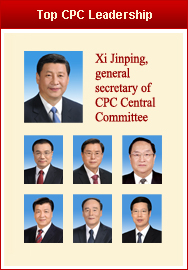
Top News
A new generation of leaders
Xi's address to the media
World welcomes China's leadership change
Video
